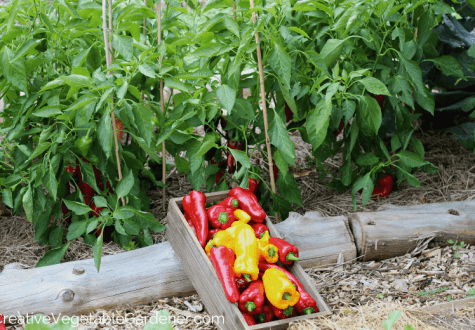Discover the Best Fertilizers for Peppers: Top Picks for Optimum Development
Discover the Best Fertilizers for Peppers: Top Picks for Optimum Development
Blog Article
Organic Vs. Synthetic Fertilizers: Which Is Best for Supporting Healthy And Balanced Pepper Plants?
In the world of supporting healthy pepper plants, the option in between synthetic and organic plant foods stands as a crucial choice with far-ranging effects. While both choices goal to supply crucial nutrients to sustain plant development, the subtleties of their influence on the soil, plant health and wellness, and the atmosphere spark an argument that echoes throughout the horticulture area. Recognizing the distinctive benefits and possible mistakes of each fertilizer kind is crucial for pepper farmers seeking to optimize their returns while preserving a sustainable and eco-conscious strategy.
Benefits of Organic Plant Foods
Organic fertilizers supply a sustainable and environmentally-friendly technique to nourishing pepper plants, offering essential nutrients without the usage of synthetic chemicals. These all-natural fertilizers are originated from organic sources such as garden compost, manure, bone meal, and algae, promoting dirt health and biodiversity. Unlike synthetic plant foods, organic alternatives release nutrients gradually, ensuring a balanced and consistent supply for pepper plants to thrive.
One considerable advantage of organic plant foods is their ability to enhance dirt framework and water retention. By improving dirt health, organic plant foods promote useful microbial task, which aids in nutrient uptake by pepper plants. Furthermore, natural fertilizers decrease the threat of chemical run-off, securing water resources from air pollution and safeguarding the atmosphere.
In addition, natural fertilizers add to long-lasting soil fertility by advertising the growth of valuable soil microorganisms. These microorganisms aid break down raw material, launching nutrients in a kind that is easily obtainable to pepper plants. best fertilizers for peppers. By fostering a healthy soil environment, natural plant foods sustain lasting pepper farming practices that benefit both plants and the environment
Disadvantages of Synthetic Fertilizers
Synthetic fertilizers, in contrast to their organic counterparts, present various drawbacks when utilized to nurture pepper plants, affecting both plant health and wellness and ecological sustainability. One significant disadvantage of artificial plant foods is their propensity to seep nutrients from the soil swiftly.
Additionally, the overuse of synthetic fertilizers can add to water contamination. Excess fertilizers not absorbed by plants can get rid of right into water bodies, bring about eutrophication, where algae blossoms deplete oxygen levels in the water, harming marine life. Moreover, synthetic plant foods are generally stemmed from non-renewable sources, such as nonrenewable fuel sources, contributing to carbon exhausts and ecological deterioration during their production.
Nutrient Absorption Comparison
Reliable nutrient absorption plays a vital role in the general health and growth of pepper plants. When contrasting synthetic and organic plant foods in terms of nutrient absorption, natural plant foods have the advantage of supplying a much more balanced and slow-release resource of nutrients (best fertilizers for peppers). Organic fertilizers contain a range of macro and trace elements that are not only useful for the plants yet also promote healthy and balanced dirt microbial activity, which helps in nutrient uptake. On the various other hand, synthetic fertilizers typically provide a quick release of nutrients, which can cause seeping and runoff, resulting in lower nutrient absorption rates by the plants.
Furthermore, organic fertilizers enhance soil structure and water retention capability, enabling pepper plants to gain access to nutrients a lot more effectively. This enhanced soil high quality helps with root advancement, making it possible for better nutrient absorption. Synthetic fertilizers, although at first increasing plant development as a result of their high nutrient focus, might impede lasting nutrient absorption by derogatory dirt wellness with time.
Ecological Effect Considerations

On the various other hand, synthetic plant foods, although commonly more focused and promptly offered to plants, can have damaging impacts on the environment if not applied appropriately (best fertilizers for peppers). Their manufacturing needs high power inputs, resulting in greenhouse gas exhausts and adding to environment change. The drainage of excess synthetic plant foods can contaminate water resources, leading to eutrophication and damaging water ecological communities.
Best Fertilizer Practices for Peppers
To accomplish this, it is necessary to comply with best fertilizer practices customized to the specific demands of pepper plants. One crucial practice is to perform a dirt examination prior to using any fertilizers.
One more important technique is to feed pepper plants at the appropriate time. Commonly, peppers profit from receiving fertilizer at growing and after that once again when they start to blossom. Over-fertilizing can bring about nutrient imbalances and damage the plants, so it is crucial to comply with recommended application prices.
In addition, selecting a balanced fertilizer with an NPK proportion that fits pepper plants' requirements is basic. Organic plant foods, such as garden compost or manure, can be superb selections as they release nutrients gradually and boost soil framework gradually. Artificial fertilizers can provide a fast nutrient boost when required. Eventually, combining artificial and organic plant foods carefully can help support healthy and balanced pepper plants while minimizing ecological impact.
Final Thought

Organic plant foods provide a lasting and environmentally-friendly technique look these up to beneficial pepper plants, offering crucial nutrients without the use of synthetic chemicals. Unlike artificial plant foods, organic choices launch nutrients slowly, guaranteeing a balanced and consistent supply for pepper plants to grow.
Synthetic fertilizers, in contrast to their natural equivalents, posture various negative aspects when utilized to nourish pepper plants, influencing both plant health and environmental sustainability. When contrasting natural and artificial fertilizers in terms of nutrient absorption, organic fertilizers have the advantage of supplying an extra well balanced and see this here slow-release resource of nutrients.Moreover, organic plant foods enhance dirt structure and water retention capacity, allowing pepper plants to gain access to nutrients much more effectively.
Report this page